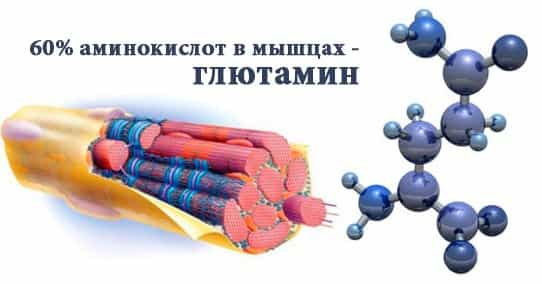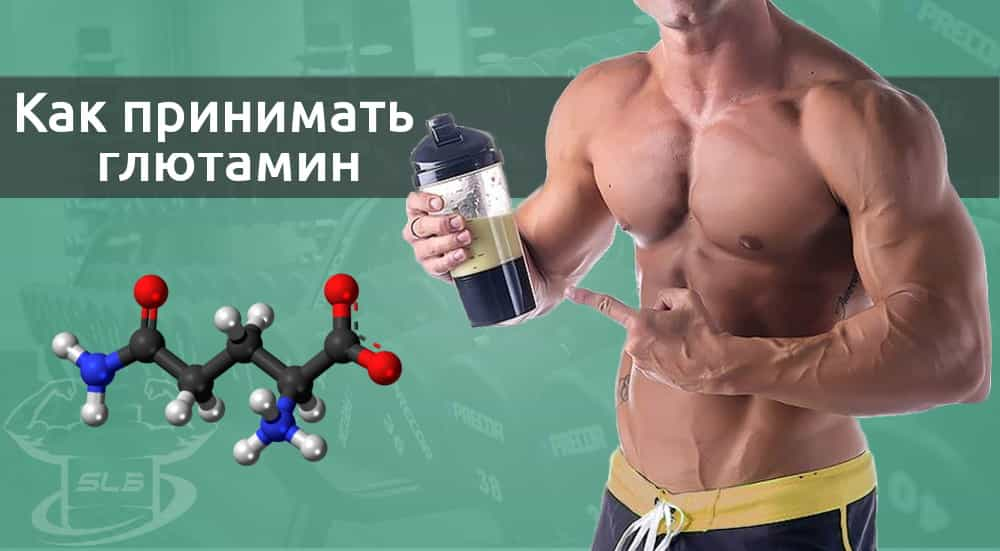Glutamine is an essential amino acid that is directly involved in the creation of protein. It is a replaceable amino acid, as it is able to be produced in the body from other amino acids. However, despite this, for professional athletes, glutamine is almost the only tool that supports anabolic processes in the muscles and protects the muscles from the harmful effect of overtraining.
Effects and properties
Glutamine is almost the only amino acid that performs so many functions. Its importance comes from its extensive presence in tissues and plasma. What happens to the body in a stressful state, when its resources are depleted by extremely heavy training? - At this point, the body actively consumes glutamine reserves to restore muscle tissue and its concentration in the muscles is significantly reduced.
 Although this amino acid is reproduced by the body, however, under conditions of prolonged heavy training, the body needs much more glutamine to meet the huge costs of this substance.
Although this amino acid is reproduced by the body, however, under conditions of prolonged heavy training, the body needs much more glutamine to meet the huge costs of this substance.
Glutamine is produced in muscle tissue. Muscles are able to combine ammonia and glutamate to form glutamine. This is the most widespread amino acid, its reserves are about 60% of all amino acids contained in muscle cells. If necessary, it is released into the blood to supply other tissues with this amino acid and increase its level in General.
The amino acid regulates the level of ammonia in the body, which can be harmful to cells. Ammonia is used to produce glutamine and deliver it to the blood. It is then transferred to other tissues to be used as fuel, especially in cells of the immune system. Glutamine is directly involved in the regulation of protein synthesis and has a strong effect on anabolic processes. Therefore, glutamine is one of the main amino acids in the body.
If the human physiology is affected by any external factors, for example: stress, mental work, hard physical work, the body's needs for it can increase dramatically. One of these effects in the form of stress on the human body is prolonged physical training with heavy weights. During training, the body's need for glutamine increases in proportion to the applied stress. As a result of this stress, its level in the body is noticeably reduced. To replenish these reserves, the muscles begin to release glutamine from the reserve into the blood.
Intensive training or hard physical labor-contributes to the production of lactic acid and ammonium in the muscles. The body, to cope with these toxic substances, dramatically increases the production of glutamine from glutamate and ammonia, the produced amino acid is transported to the blood and its level rises within five minutes of exercise.

Heavy training also leads to the production of catabolic hormones, such as corticosteroids. These glucocorticoids also Deplete the stores of this amino acid in the muscles.Excessive concentration of corticosteroids in the blood leads to the fact that glutamine continues to be released into the blood, even after exercise has stopped and the body no longer needs it in large quantities. As a result, its reserves are significantly depleted.
Athletes who often use heavy physical activity in their practice should be able to find the line between overtraining and insufficient intensity of training.
The effect of overtraining comes when the intensity of training is not consistent with the body's recovery capabilities. If an athlete has entered the stage of overtraining, all his efforts will have the opposite and negative effect. The more he trains , the less the effect will be. Overtraining, in turn, leads to the depletion of glutamine reserves, and since there is not enough time to restore these reserves, its level will decrease every day. Athletes who often suffer from overtraining are more susceptible to diseases and infections due to an overly weakened immune system. Therefore, it is very important to take medications containing glutamine. Taking a Supplement from the outside will speed up the recovery process in the body and increase the concentration of glutamine in the blood plasma.
How to accept
Mix one serving (5 g = 1 teaspoon) with water, juice or weight gainer and protein shake. You can also take it with regular food. It is recommended to take up to 10-20 g of glutamine per day for strength training (depending on the intensity) and up to 20 g in order to stimulate the immune system in conditions of illness and stress. Even intake throughout the day in portions of 5 g ensures its most complete absorption by muscle cells. On days with training, it is recommended to take immediately after training, before training, and before going to bed.
0 reviews / Write a review
